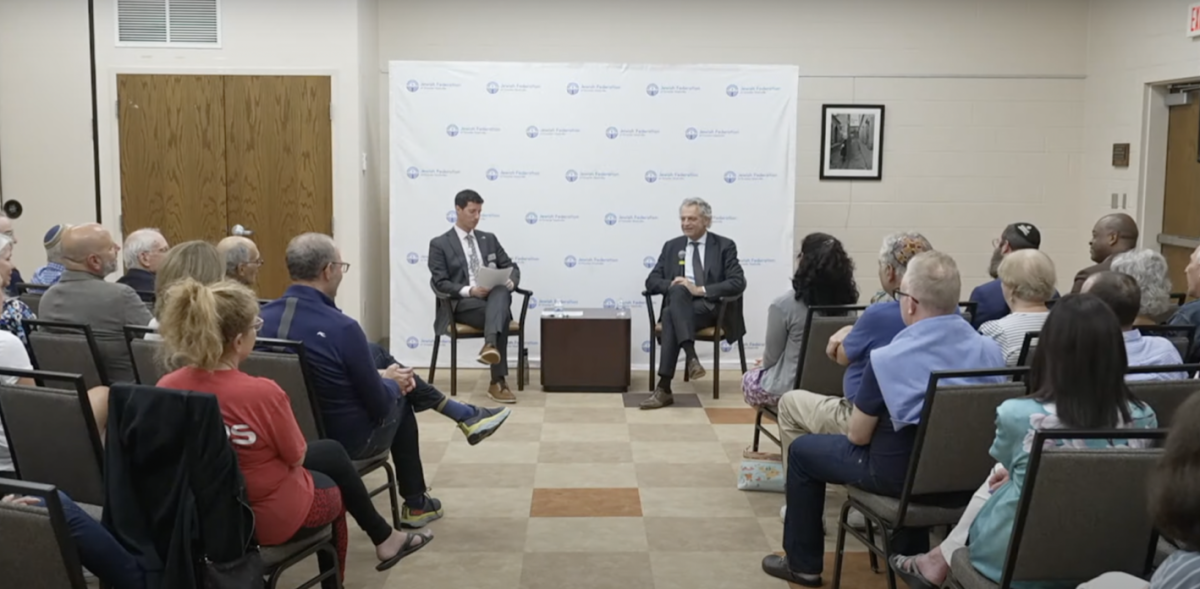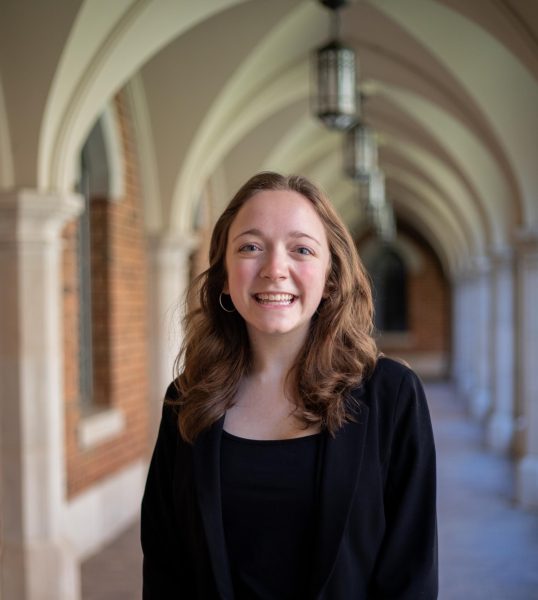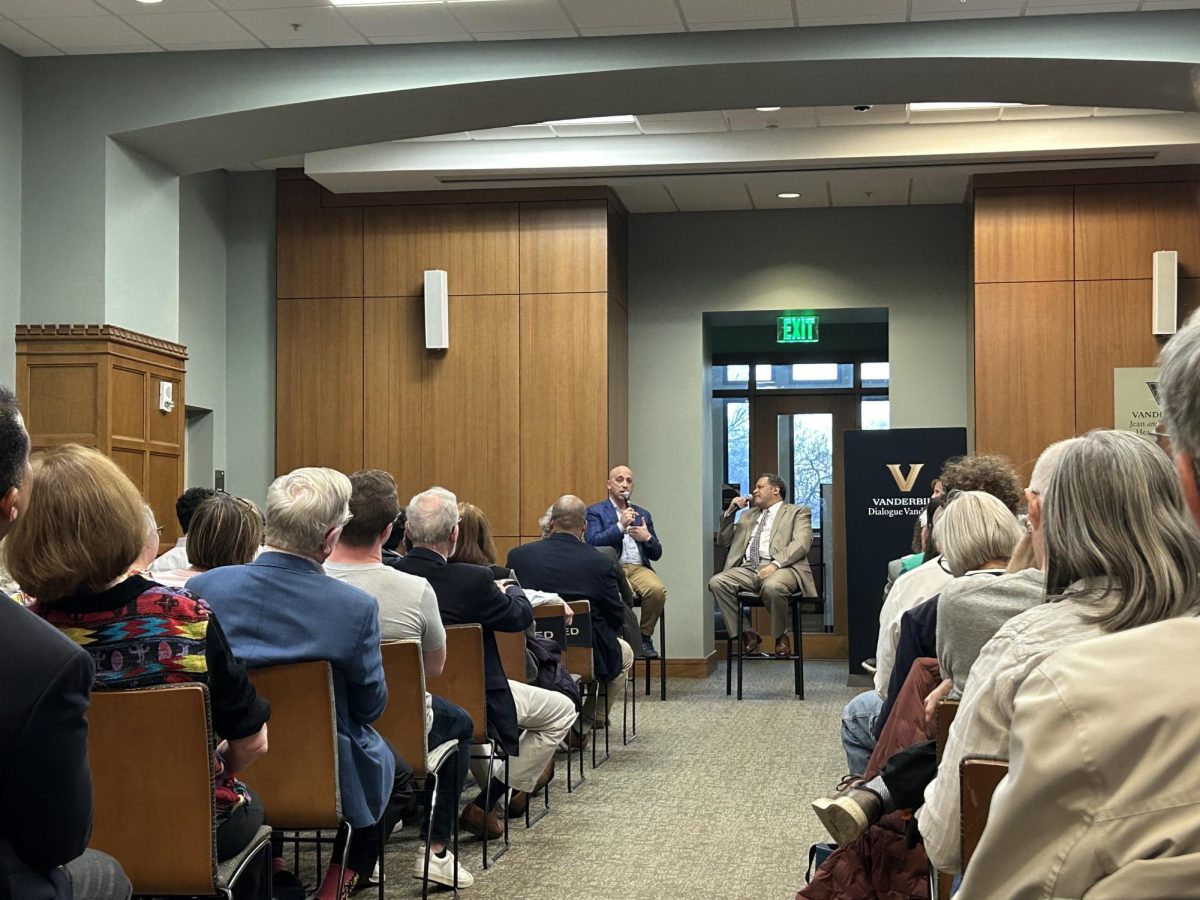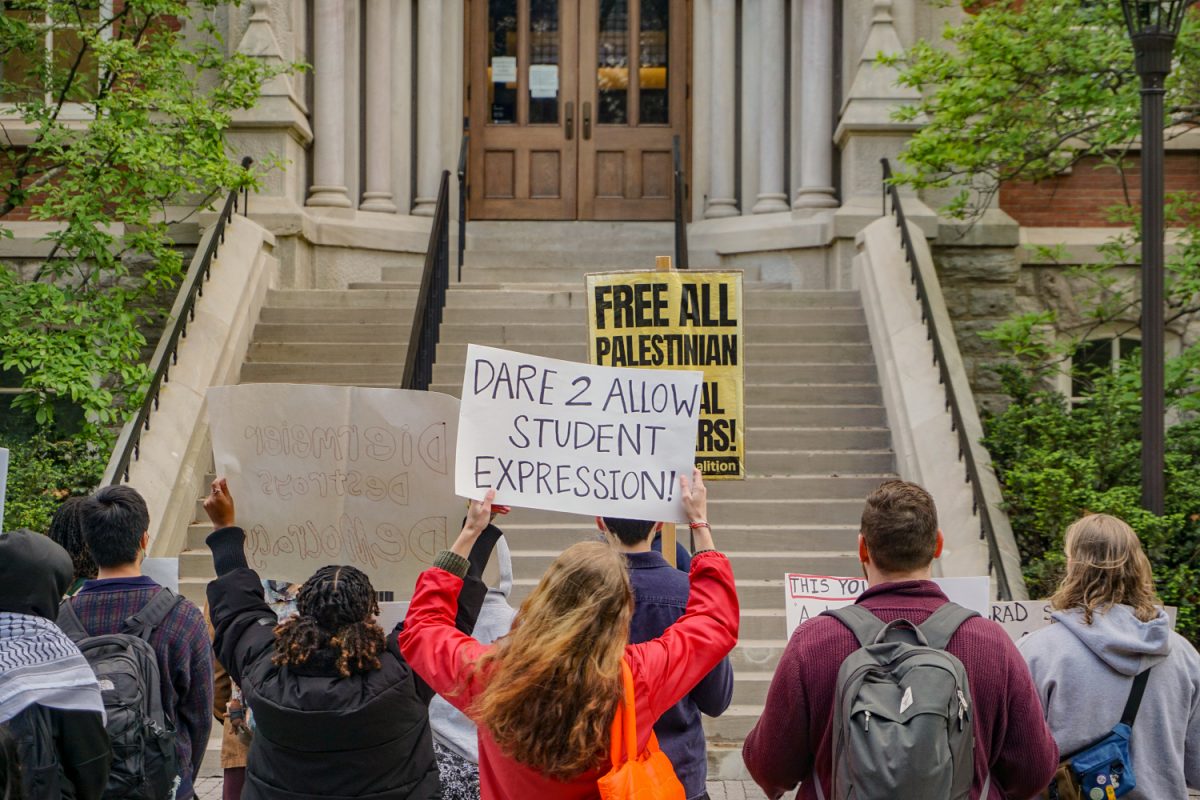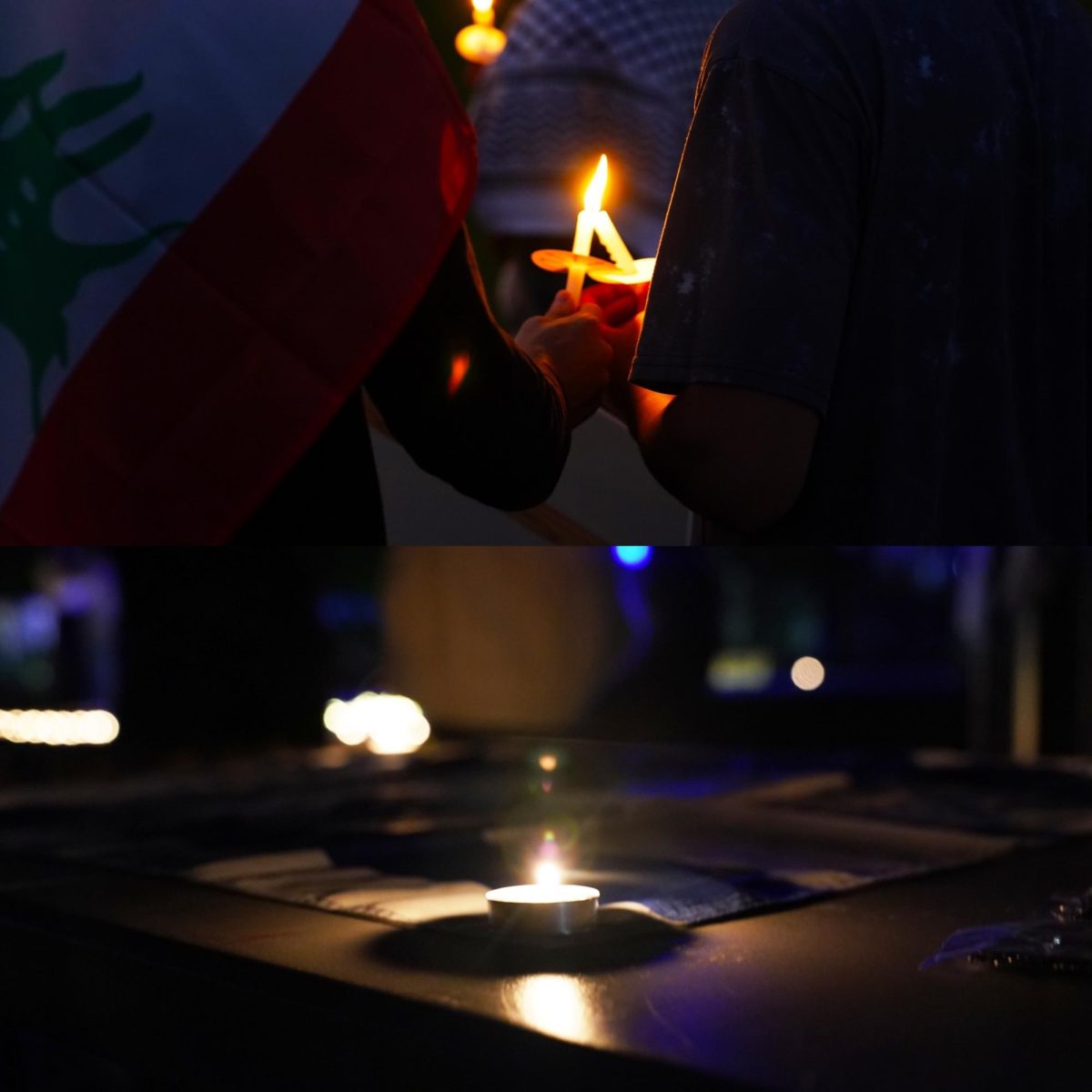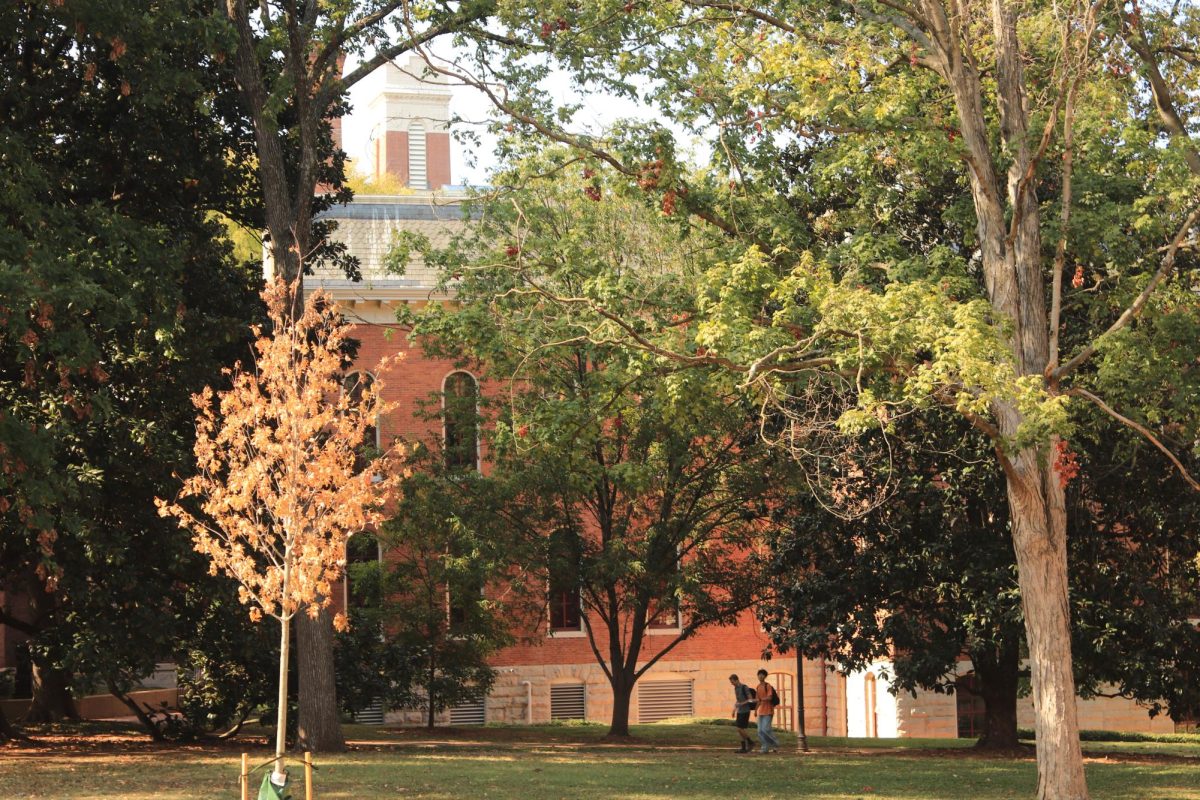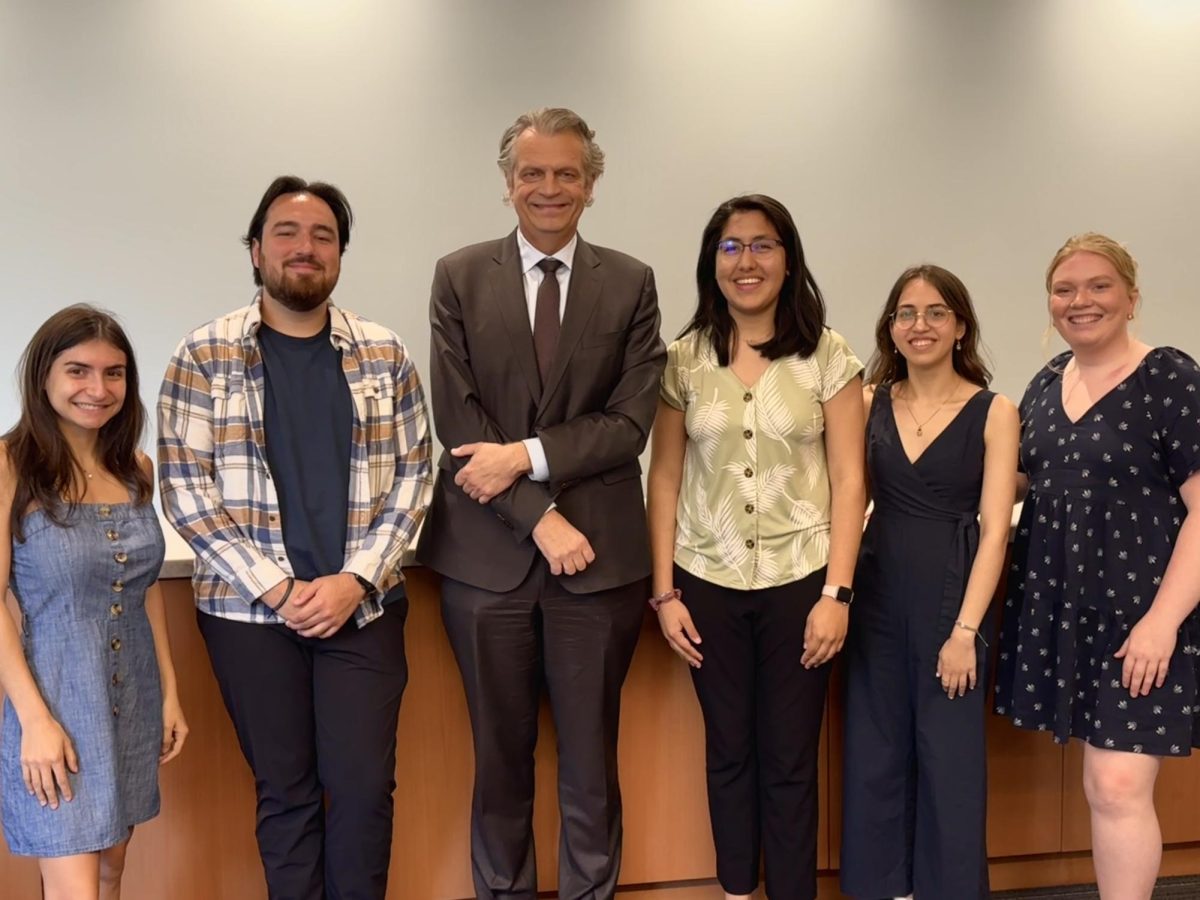CORRECTION: This article was corrected on July 17 at 10:26 PM CDT to include information provided by the university to clarify that Chancellor Daniel Diermeier was not paid to speak at the June 10 event.
The Jewish Federation of Greater Nashville hosted Chancellor Daniel Diermeier on June 10 to discuss principled neutrality and campus protests. CEO of the Jewish Federation Rabbi Dan Horowitz moderated the conversation to an audience of approximately 35 in-person attendees with over 50 people viewing the virtual livestream.
Diermeier’s participation in this event was publicly criticized by the Vanderbilt Divest Coalition and the Palestine Hurra Collective ahead of his attendance. The joint statement alleges that Diermeier’s involvement with the event contradicts his stance of principled neutrality.
Principled neutrality
Horowitz opened the discussion with a question about Diermeier’s background and journey to Vanderbilt and then asked Diermeier to define the university’s position of principled neutrality, which he has promoted since his appointment to Vanderbilt in 2020. Diermeier said he believes principled neutrality encompasses the values that enable transformative education and path-breaking research. He also cited the values of a commitment to free speech as well as an environment open to speakers of all viewpoints and civil discourse as crucial to achieving the goals of the university.
“The core belief of institutional — or principled — neutrality is that if the university doesn’t have a duty to speak on something, it should remain silent,” Diermeier said. “What does it mean in practice? It means that on issues that are not core to the functioning of the university, the university will not take a position.”
Diermeier then discussed the Boycott, Divestment and Sanctions movement, saying that the concept contradicts the idea of principled neutrality. He said supporters of the BDS movement have called on the university to divest funding from Israel since December of last year.
“We’re not going to do that,” Diermeier said. “We’re not going to boycott or divest from Israel like we wouldn’t divest from other countries.”
Horowitz then presented a concern from a friend about whether some professors may look for specific opinions to be held by their students when determining how to award grades. Diermeier said faculty and students should be allowed to hold political positions, but that the role of the university — including individual schools and departments — is to remain neutral.
“By taking a position on this or that or the other, you’re encouraging your campus to become politicized because now there’s value in constantly pressuring the university to take a position on this or the other,” Diermeier said.
Diermeier went on to say that faculty members should not favor students or assign grades based on political positions although he believes professors should be able to express their opinions separate from their jobs.
“It’s clearly not anything that we see as consistent with the role of a faculty member. Now, where things get interesting is when they are a great professor [and] they take positions outside of the classroom,” Diermeier said. “We are pretty lenient on that.”
Campus protests
In discussing the March 26 sit-in inside Kirkland Hall, Diermeier reiterated the university’s public statements about the building’s construction status and the alleged harm done to a security officer. He labeled the response from the community — among Nashville residents, alumni, students, parents and faculty — as “very positive.” Diermeier said he garnered the most positive responses to his opinion piece in the Wall Street Journal, although he acknowledged the criticism he received from faculty members.
“I think we had the first encampment in the country — it was way before Columbia [University]. The weather was nicer, and it was maybe 10 tents and maybe like 15 students,” Diermeier said. “We didn’t have a clear policy on that. We’re now looking at it in more detail. We talked to the students and we told them ‘as long as you behave properly, that’s fine.’ They were there and there was no issue whatsoever.”
Diermeier said the students in front of Kirkland Hall were told the encampment had to end to make space for commencement activities. He said he sees the sit-in protest as an “isolated incident.”
Diermeier also alluded to actions taken by student protestors during the sit-in in which he believes the student code of conduct was violated, expressing support for the results of the student accountability process while citing concerns from faculty over whether the consequences for the incident were justified.
“We were 100% clear to say ‘this is not the way we treat each other as members of this community — you knew that — and if you didn’t know that then we told you and you did it anyway. It was done because you felt so strongly about it,’” Diermeier said. “I cannot have members of my community being injured. We’re not doing that. We’re not breaking into buildings. If that’s what you do, then there are consequences for you. Crystal clear.”
Diermeier said it can become difficult to lead the university when there is disagreement about what actions are right and wrong, although he expressed optimism that universities around the nation are realizing their principles have always been unclear. He said he wishes Harvard had “gone further” in their decision to refrain from taking official positions on public policy issues following campus protests — as stated in his June 12 Wall Street Journal article — but that he appreciates the steps towards a stance of principled neutrality.
“For us, this is not a new thing,” Diermeier said. “When you look at Vanderbilt’s history, these principles were clearly stated — they just weren’t called that [principled neutrality] — by Alexander Heard, our fifth chancellor who stated them clearly in the late 60s and early 70s.”
Diversity, equity and inclusion
Horowitz concluded the conversation with a question about DEI and its relation to principled neutrality, to which Diermeier said he believes it is important that students who find Vanderbilt to be a good fit for them should be able to attend regardless of their background, referencing recent updates to financial aid.
“When you arrive on campus and when you are a member of our community, we want to make sure that you thrive, that you feel that you fully belong and you can realize your full potential as a student,” Diermeier said.
Diermeier discussed his experience as a first-generation college student, saying campus life can be difficult for students in similar situations. He believes providing support to students is a fundamental value to the university.
“When things get problematic is when those values that are fundamental to us get hijacked by a political ideology. Then we have a problem,” Diermeier said.
Audience questions
In responding to a question from an audience member concerning the sit-in at Kirkland Hall, Diermeier said he was unaware of the protestors’ motives other than their desire to occupy his office.
“There was never any stated motive other than that this was a form of disruptive protest,” Diermeier said. “That’s what the students were talking about.”
Another audience member asked whether universities that only recently chosen to take neutral stances following campus protests should be trusted. Diermeier said he believes it is important to hold these universities accountable to live by these principles.
“Statements by themselves don’t mean anything if people don’t live by them,” Diermeier said. “You’ll find out whether they live by them the next time there’s a tricky situation.”
Diermeier explained his belief that universities should not take sides in political issues.
“It is a very problematic thing for universities to do to take a side in a contentious [and] contested policy debate,” Diermeier said. “You shouldn’t do it. That’s what principled neutrality says. You shouldn’t do it because you want to create a space where these issues can be debated.”
To conclude the discussion, Horowitz asked Diermeier to describe his vision for the future of Vanderbilt following the recent extension of his contract through 2035. Diermeier expressed excitement for the continued growth of the university as well as the potential opportunities to contribute to the Nashville community.
“I really think that we will have phenomenal years ahead of us,” Diermeier said.
Response to the event
In a press release sent to The Hustler and a post on Instagram on May 24, VDC and PHC criticized Diermeier’s attendance at the speaker event. The Instagram post — supported by other local pro-Palestinian organizations — says the Jewish Federation has held rallies in support of Israel’s occupation of Palestine and cites their fundraising efforts of over $900 million for Israel in the past seven months.
“Diermeier’s paid opportunity to speak at this event is directly antithetical to this reservation of political comments,” the press release reads. “His unprincipled engagement with openly zionist organizations jeopardizes the very culture of neutrality that he attempts to create on Vanderbilt’s campus.”
VDC said Diermeier’s participation in the event was hypocritical and contradictory to his stance of principled neutrality.
“There is real hypocrisy in calling yourself ‘neutral’ when you speak at and get paid by an openly zionist organization,” VDC said in the press release. “The very idea of ‘campus neutrality’ during an ongoing genocide makes no sense. There is no way to be neutral.”
According to a university representative, Diermeier did not receive compensation for speaking at the June 10 event. The representative also said Diermeier has accepted invitations to attend future events with other religious organizations including the Woodmont Community Church — where he spoke on June 12 — and the Islamic Center of Nashville — where he will speak in August.
In the same press release, the PHC said Diermeier has taken a “pro-zionist position” through his agreement to participate in the June 10 event. The press release and Instagram post both cite Diermeier’s stance of principled neutrality in response to past protests in support of university divestment from fossil fuels as hypocritical given his connections to the fossil fuel industry.
Rabbi Shlomo Rothstein, director of Vanderbilt Chabad, attended the speaker event and said he was “surprised” and “disheartened” to see that Diermeier’s participation had been met with backlash as he expressed appreciation for the discussion of the university’s values.
“Something that stood out to me from the Chancellor’s talk is how much Vanderbilt values civil discourse and for all students to remember that they are part of one community,” Rothstein said in a message to The Hustler. “I hope and pray that our community returns to these values.”

